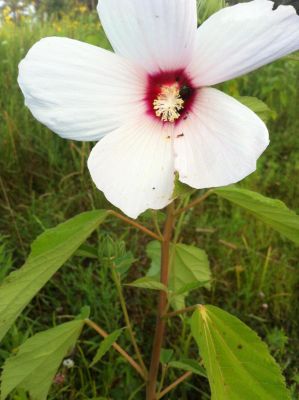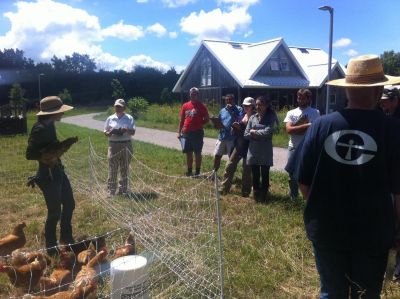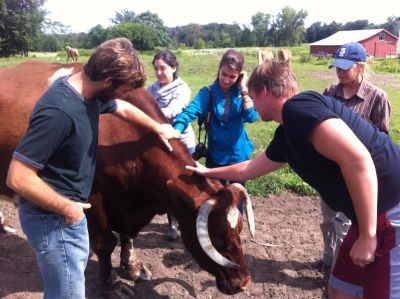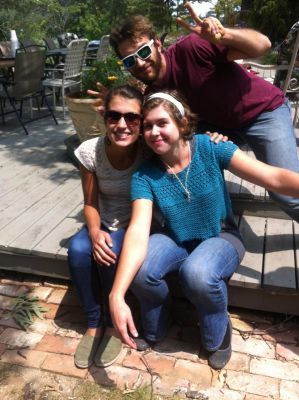Marshmallows and Teaching in the Field

The month of July began with violent storms blowing through northern Indiana. After the storm’s passing we were grateful that the greenhouse was undamaged, and we got out our shovels and used compost to prop up the sweet corn and popcorn plants that had blown over from straight line winds.
And the month got much better! Vegetables slowly developed, prairie flowers bloomed. Many great people came and several left.
July ended up being even more of a transition time than usual this year! Two new classes began: agroecology and small farm management and marketing. Diana, who chose to take the first two classes, left us for her next endeavors in South Carolina. Meanwhile, a returning student who’d completed two of the courses in 2013 rejoined the ASI community. Andre was enthusiastic about returning to Merry Lea, pleased to discover the completion of the new animal barn and our five-acre permaculture planting. We on staff at Merry Lea sometimes forget how much change we’ve experienced in the past year!

Adding to the transient feelings this July, one of our volunteer interns, Aaron, found a position in his field of trainin in Mishawaka and said goodbye at the end of July. Then came a new cohort of graduate students taking the Masters of Arts in Environmental Education, a few of whom expressed interest in sustainable food systems. We began seeing a series of new faces around Rieth Village once the MAEE program began.
By this time it seemed as if the Agroecology students were family. Community meetings led by Tom Hartzell, our student life coordinator, kept the spirit at Rieth Village smooth, cooperative, and full of laughter and fun! It never hurts to have outings to town for ice cream, swimming in High Lake, and the occasional afternoon basketball tournament.
In the agroecology course, students gave brief outdoor field presentations explaining concepts they had learned. Nina explained the role of our pasture-raised chickens in the agroecosystems of the farm while Andre highlighted the composting system and use of compost in vegetable production. Ruth shared about her research investigating the impact of planting native flowers between rows of potatoes on insect biodiversity and Colorado potato beetle populations and foliar damage. Finally, Jake gave attendees a tour of cover cropping systems throughout the farm, explaining benefits and challenges. We all learned from each other: staff, grad students, undergraduate researchers, interns, and Merry Lea volunteers who attended. Learning seems to come alive when you are asked to teach the content to others!

As a culminating project in the second half of the ASI program, students crafted imaginary farm business ventures as part of the Small Farm Management and Produce Marketing class, with lectures and guidance by Michelle Horning and Melissa Kinsey. How encouraging it is to see students put together the pieces of concepts, practices, and marketing plans! Proposed enterprises included a pasture beef operation, an urban agrotourism + farm wedding venue, an organic dairy + milk delivery operation, and a hops farm. I wonder if some of these ventures will come to fruition in years to come? Time will tell…
The July field trips were very special. On the 23rd, students visited Clay Bottom Farm in Goshen, followed by a visit to Tillers International near Kalamazoo, MI, to see draft animal-powered agricultural systems, continuing on to White Yarrow Farm in Marcellus, MI, to see vegetable and flower production, and ending with an urban community gardening adventure in Three Rivers, MI, with the faith communityCulture Is Not Optional.

Our final field trip involved a tour of the Pioneer seed corn plant in Constantine, MI, quite a contrast to the scale and approach to agriculture shown by other farms we had visited. One of ASI program’s 2011 graduates, Jon Templin, started Butternut Sustainable Farm soon thereafter and remains a popular ASI destination to this day. After an impressive farm tour and meal, we were treated to a swim in the nearby lake. Everyone had a blast that sunny day in Michigan.
Back at the ranch (Merry Lea Sustainable Farm!), research came to a close. Our Maple Scholar, Jack, wrapped up his summer of documenting the leaf-out and flowering of the perennials growing in the newly-planted Woody Perennial Polyculture plots. This coincided with completion of the summer-long project of mulching the 48 180 foot-long rows! Students, staff, and researchers were all very proud of this accomplishment.
Despite the record cool month of weather, we have nothing but smiles in reflecting back on July 2014.
– Jon Zirkle




